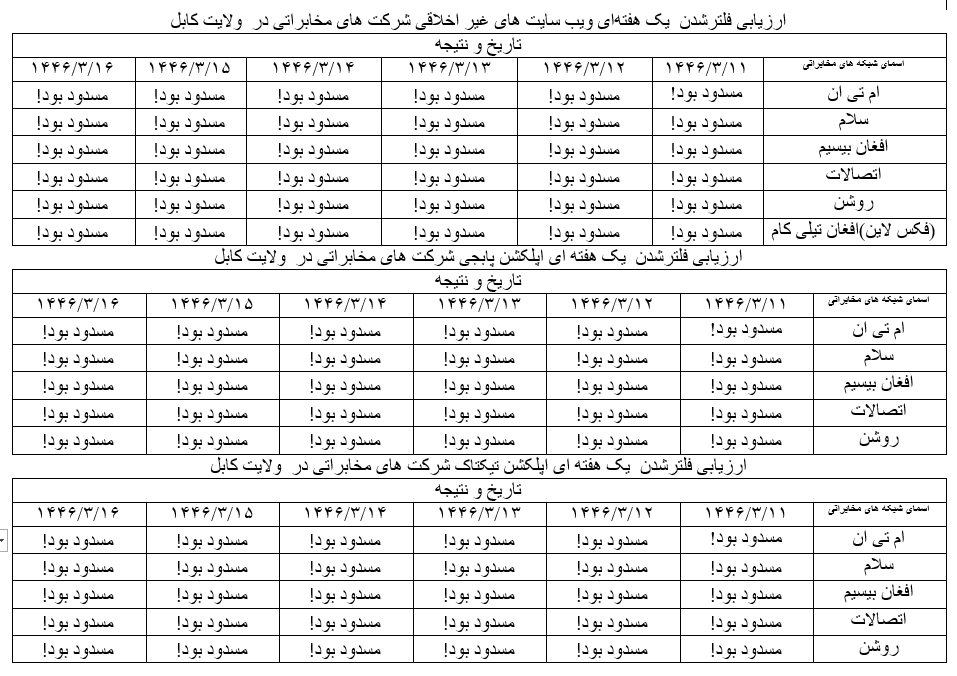On 20 September 2024, Taliban Spokesperson Zabihullah Mujahid published a statement on X (formerly Twitter) from the Taliban’s Prime Minister Hasan Akhund “on preventing controversial discussions and debates.” The full statement, comprising eight directives, addresses religious scholars, and insists that they avoid discussing controversial and divisive issues in the media.
The statement also asks scholars not to discuss complex issues and those related to Sufism, arguing such discussions are for “particular audiences.” The directives against discussing topics related to Sufism have reportedly faced backlash and condemnation. The directives also ask the public and those in charge of religious schools not to facilitate or invite “those scholars who incite disputes, promote superstitions, continue to use discussions, debates, and inappropriate language in public media, and create doubt and discord among the people do so to gain popularity or vent their frustrations.”
On 23 September 2024, the Afghanistan Journalists Centre (AJC) further reported that the Taliban’s Ministry of Information and Culture had notified media personnel of the new restrictions in a meeting conducted on 21 September 2024.
AJC claimed they had obtained a copy of the document, which outlines eight restrictions on media, including a ban on the live broadcast of debates, criticism of Taliban officials, laws and policies. The document also warns of consequences in the case of violations, and includes a list of “experts” approved by the Taliban to give interviews, commanding media outlets to request approval from the Media Oversight Directorate of the Ministry of Information and Culture should they decide to include a name not mentioned on the list. The AJC also claimed that they had accessed the list of Taliban-approved experts with 68 names, but did not enclose the list in the report.
On 26 September 2024, a list was circulated on X which claimed to contain the names of 64 “experts” approved by the Taliban, including Taliban officials and government staff, as well as pro-Taliban individuals. Two of the pro-Taliban individuals contained in the list were women, including Farah Mujahid, an individual based in Germany who has appeared in the media supporting the Taliban’s treatment of Afghan women. The list also includes the names of a former MP and pro-Taliban ethnic Hazara Jafar Mahdavi, and Hezb-e Islami affiliated Fazel-Minallah Mumtaz.
On 24 September 2024, 8am Media reported that several Taliban officials had travelled to Herat province. 8am Media claimed that the representatives had instructed media in the Western zone (provinces in west Afghanistan) to act as a “propaganda tool” for the group’s Promotion of Virtue and Prevention of Vice Ministry. Additionally, the officials directed Taliban media staff and spokespeople in the Western zone not to discuss security issues with media or topics that might jeopardise Taliban interests. Moreover, journalists told 8am Media that the Taliban were seeking to confront Afghan media operating from abroad, accusing them of “committing cultural invasion and spreading rumours.”
Taliban block access to “immoral” websites, applications and TikTok
On 21 September 2024, the Taliban’s Ministry of Communication and Information and Technology (MCIT) announced that they had monitored the filtering of “immoral sites” and applications, such as TikTok and the online multiplayer game PlayerUnknown’s Battlegrounds (PUBG), and blocked their access countrywide through the use of telecommunication companies in Kabul.
According to the ministry, the services of five telecommunications companies, Afghan Wireless, Etisalat, Salam, MTN and Roshan in Kabul, were monitored and reviewed to ensure the websites and applications were blocked. The ministry posted a table alongside a week-long assessment of the websites. In the table, the websites and applications were marked as “blocked” by all service providers in Kabul. PUBG is reported to be a popular video game in Afghanistan, with around 100,000 players using the service at peak times. The former Afghan government also deemed the game harmful and had planned to ban its use.
 Figure: Table shared by the Taliban’s Ministry of Communication and Information Technology on X on 21 September 2024. The table title reads: “ Evaluation of one-week filtering of immoral websites in Kabul province.”
Figure: Table shared by the Taliban’s Ministry of Communication and Information Technology on X on 21 September 2024. The table title reads: “ Evaluation of one-week filtering of immoral websites in Kabul province.”
Similarly, TikTok is used increasingly by younger Afghans, with estimates ranging from 325,000 to 2 million users in Afghanistan. Taliban Prime Minister Mohammad Hasan Akund had reportedly ordered the closure of TikTok and PUBG in 2022, claiming that the social media site was misleading the younger generation.
Despite the order, pro-Taliban social media activist Mobeen Khan continued to use an account on TikTok with 195.9K followers, and his latest post was on 28 June 2024. AW investigators also noted several other pro-Taliban accounts on TikTok, some regularly posting videos until 9 February 2024. Sources in Balkh province confirmed to AW that TikTok had been banned in the country as of 27 September 2024, but they remained able to access the application using a Visual Private Network (VPN).
Taliban prosecution and punishment of political analysts and journalists
During the same time period, AW recorded several arrests and sentencings of political analysts and journalists. On 27 September 2024, Afghanistan International reported that on 26 September 2024, Jawid Kohistani, a political analyst based in Kabul, had been detained by the Taliban.
On 29 September 2024, Amu TV reported the detention of another political analyst, Khyber Hoshmand, in Kabul. According to Amu, Hoshmand was arrested by the Taliban on 22 September 2024 in Police District (PD) 8 of Kabul.
Also on 29 September 2024, several Afghan media outlets reported that the Taliban’s military court had sentenced two journalists, Aref Hijran and Ahmad Kamran, to 10 years of imprisonment, following their arrests in July 2024. Hijran was reportedly sentenced for photographing Taliban checkpoints and Ashura commemorations.


